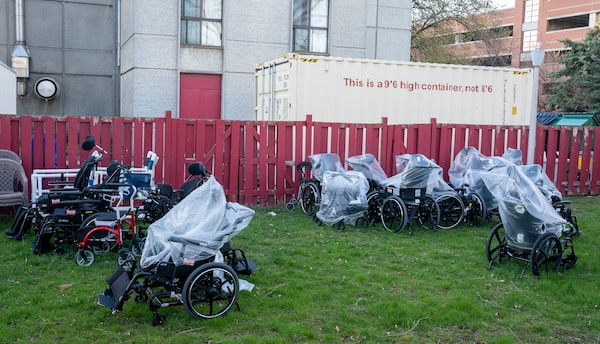
Wheelchairs sit behind Camilla Care in Mississauga, Ont., on May 12, 2020.Frank Gunn/The Canadian Press
Peter Jacobsen is a founding partner at Bersenas Jacobsen Chouest Thomson Blackburn LLP and a member of the Advisory Board of the Centre for Free Expression at Ryerson University.
James L. Turk is Director of the Centre for Free Expression and Distinguished Visiting Scholar at Ryerson University.
The lethal disgrace in Canada’s long-term care facilities could have been avoided if robust whistleblower protection had been in place.
The problems in long-term care had been well known to the facilities’ residents and their families, professional staff and employees. But they have been silenced by the fear of retaliation, mistreatment, ostracism, job loss or a lawsuit if they dared to report on dangerous, unhealthy or illegal conditions.
These fears are well-founded. Governments in Canada have failed to pass laws that afford real protection for anyone bringing harm to public attention, whether in long-term care homes, meatpacking plants, prisons, shelters, factories or other settings.
While there has been well-deserved criticism of the lack of government inspections in many settings, an inspection system must not be our only source of information. In all workplace settings, employees, their family members and others have vital and timely information that could be used in protecting the public interest. In order to safely share what they know, they must have whistleblower protection.
Research consistently confirms that tips from insiders are the most effective way of exposing problems within organizations, whether it be the mistreatment of individuals, fraud or endangerment of public safety.
As Ontario Premier Doug Ford said recently, when asked why it took military presence to discover the deplorable conditions in long-term care homes, “You find cracks in the system by living the system around the clock every single day.” What needs to be done is straightforward. Governments in Canada must enact robust and effective whistleblower-protection legislation that safeguards those who speak out. The essential elements of what must be included are clearly laid out in a guide developed by the Whistleblowing Initiative at Ryerson University’s Centre for Free Expression.
These guidelines include the tenet that whistleblowers must have the right to report wrongdoing. They must be protected from loopholes or qualifications concerning their motivation, unreasonable time limits and restricted channels of reporting. Protection must be available where the whistleblower’s disclosures are based on a reasonable belief, including where disclosures are made in the course of the whistleblower’s job duties, and must protect any person who makes a disclosure, whether they be an employee, contractor, temp worker, volunteer, client or family member.
Further, whistleblowers must have the right to remain anonymous and be permitted to refuse directives that are illegal or that pose a substantial risk to safety and health or the environment. Whistleblowers must also be protected from formal and informal reprisals, and these protections should extend to those who provide supporting evidence or help the whistleblower. Organizations must have a duty imposed on them to safeguard and assist any individual making disclosures and must be held liable, both civilly and criminally, for any reprisals.
Authorities must have the power to investigate allegations of wrongdoing or reprisals, and must be required to adhere to reasonable time limits for the completion of investigations.
There must also be redress for reprisals, with the onus on the party alleged to be causing the reprisal to show its actions were justified and did not constitute retaliation. Where it is found that a whistleblower has suffered from reprisals, they must be made whole, including full compensation for their legal costs. A credible corrective process must follow and include a transparent and timely investigation. Wrongdoers must not be able to hide behind privacy laws, and the reasons for dismissing cases must be reported. The court or an independent ombudsperson must have the power to stop violations or wrongdoing, conduct investigations, compel evidence, and require specific corrective action, including interim relief. Throughout the process, the whistleblower must have the right to provide more evidence, clarify points, respond to claims against them, and to see and challenge findings.
If a whistleblower elects to take another route, such as going to the media, they must also be afforded the full panoply of safeguards. Whistleblowers are often frightened and suspicious and should not be less safe if they choose to report their concerns directly to the public, rather than through the institution or the state.
Now is the time for governments to act so that this essential element of public safety is put in place. Canadians of all ages deserve comprehensive and robust whistleblower protection.
Keep your Opinions sharp and informed. Get the Opinion newsletter. Sign up today.